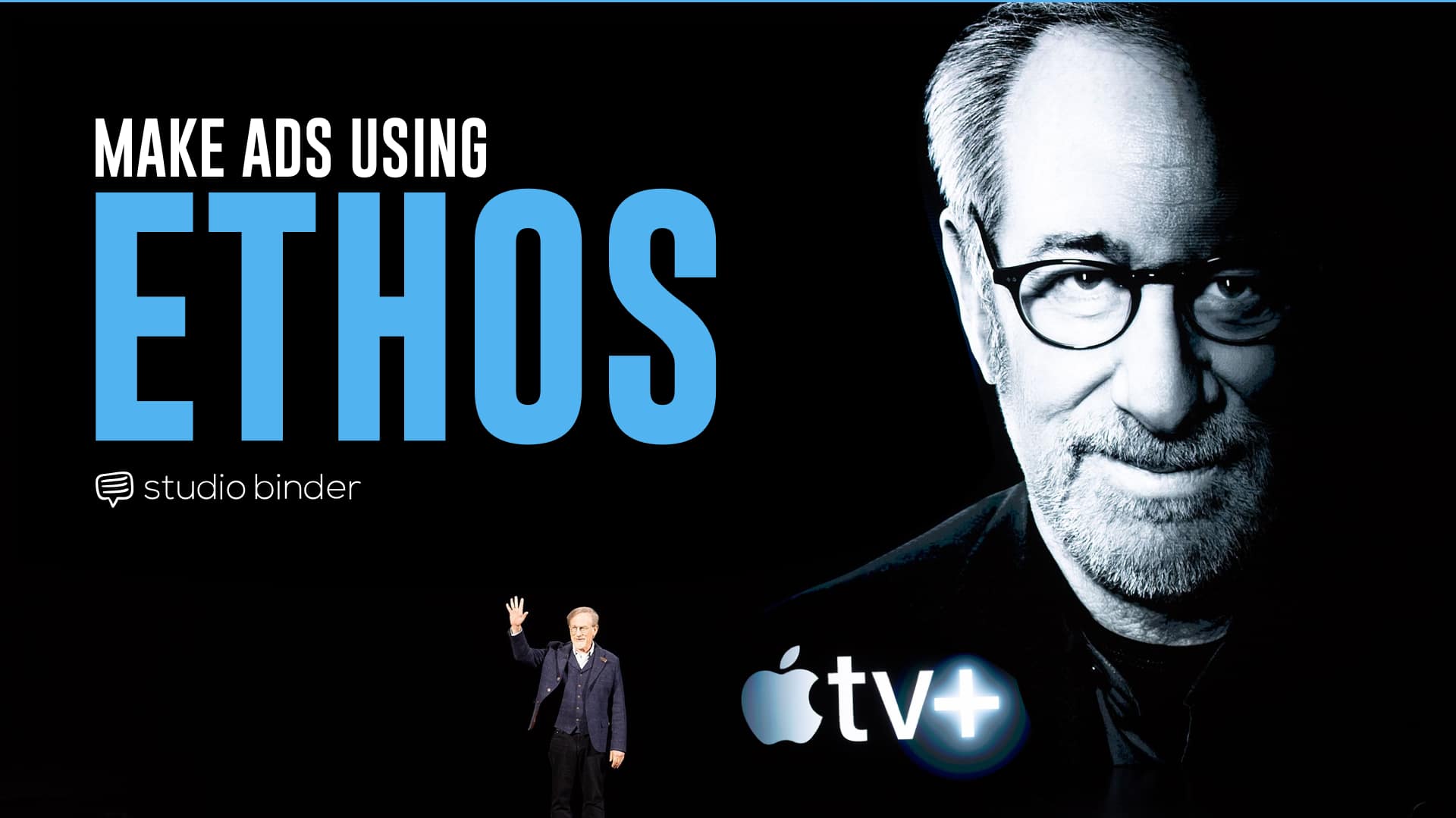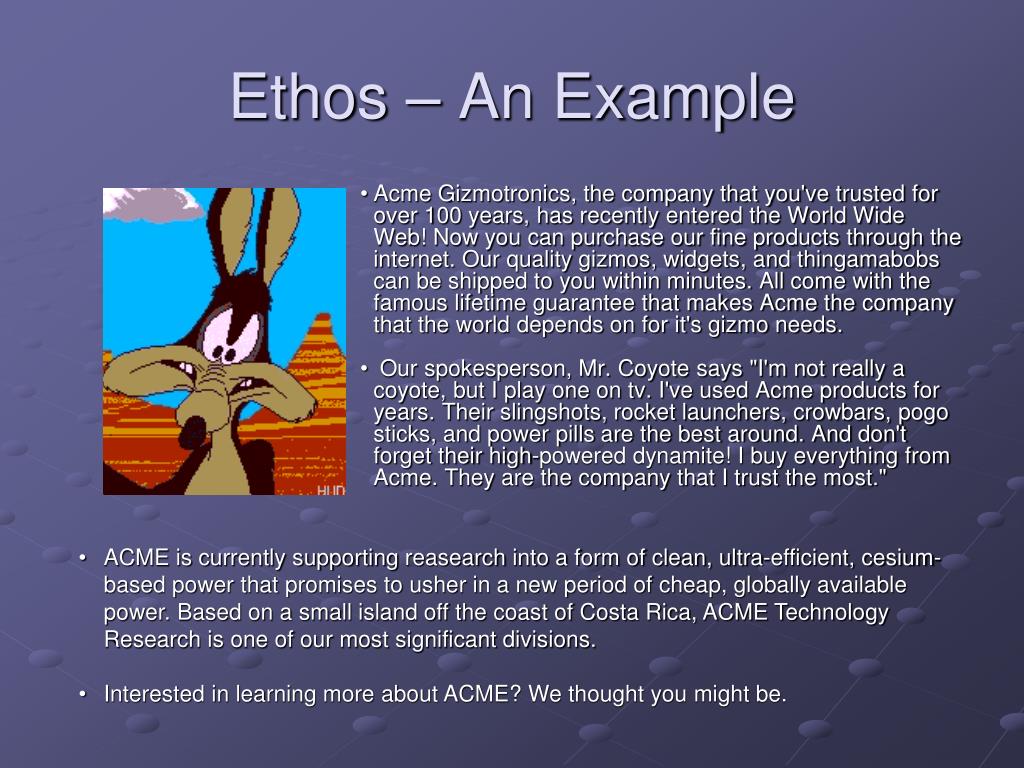Ethos Examples In Commercials: A Comprehensive Guide To Building Trust Through Advertising
Commercials play a crucial role in shaping consumer behavior, and ethos examples in commercials are pivotal in establishing trust and credibility. Ethos, derived from the Greek word meaning "character," is a rhetorical strategy used by advertisers to appeal to the audience's sense of ethics and trustworthiness. By incorporating ethos into advertising, brands aim to create an emotional connection with their audience, making them more receptive to the message being conveyed.
In today's competitive market, where consumers are bombarded with countless advertisements daily, using ethos effectively can set a brand apart. Ethos examples in commercials highlight the importance of authenticity and integrity, which are essential components for building long-term relationships with customers. This article will delve into the various ways ethos is employed in commercials, providing you with practical insights and actionable strategies.
Whether you're a marketer looking to enhance your advertising campaigns or a consumer curious about how ethos works, this article will provide you with a comprehensive understanding of ethos examples in commercials. We will explore its significance, analyze real-world examples, and discuss its impact on consumer behavior. Let's dive in!
Read also:Pluxy Epil Pro The Ultimate Solution For Smoother Skin
Table of Contents:
- What is Ethos in Advertising?
- Why Ethos is Important in Commercials
- Real-Life Ethos Examples in Commercials
- Strategies to Incorporate Ethos in Commercials
- Benefits of Using Ethos in Commercials
- Challenges in Implementing Ethos
- Ethos vs Pathos: Which is More Effective?
- Data and Statistics Supporting Ethos in Advertising
- Tools and Resources for Creating Ethos-Driven Commercials
- Conclusion and Call to Action
What is Ethos in Advertising?
Ethos, as a rhetorical device, focuses on the credibility and character of the speaker or brand. In the context of advertising, ethos examples in commercials involve showcasing the trustworthiness, expertise, and ethical values of a brand. By doing so, brands aim to establish a sense of reliability and authority in the minds of consumers.
Ethos is not just about what is said but also about who is saying it. When a brand uses ethos effectively, it aligns its values with those of its target audience, creating a deeper connection. This alignment fosters trust, which is crucial in influencing purchasing decisions.
Key Elements of Ethos in Advertising
- Authority: Demonstrating expertise in the product or service being advertised.
- Trustworthiness: Establishing a reputation for honesty and reliability.
- Relevance: Aligning the brand's values with those of the target audience.
Why Ethos is Important in Commercials
In the realm of advertising, ethos examples in commercials serve as a foundation for building long-term relationships with consumers. By appealing to the audience's sense of ethics, brands can create a lasting impression that goes beyond mere product promotion.
Consumers are more likely to engage with brands that they perceive as trustworthy and ethical. Ethos helps bridge the gap between the brand and the consumer, making the advertisement more relatable and persuasive. This is particularly important in industries where consumer trust is paramount, such as healthcare, finance, and education.
Impact on Consumer Behavior
- Increased Brand Loyalty: Consumers are more likely to remain loyal to brands that they trust.
- Enhanced Credibility: Ethos elevates the brand's image, making it more credible in the eyes of consumers.
- Improved Conversion Rates: Trustworthy advertisements often lead to higher conversion rates and sales.
Real-Life Ethos Examples in Commercials
To better understand how ethos works in practice, let's explore some real-life examples of commercials that effectively utilize ethos:
Read also:Jan Ross The Remarkable Journey Of An Iconic Personality
Example 1: Dove's "Real Beauty" Campaign
Dove's "Real Beauty" campaign is a prime example of ethos in action. By highlighting the importance of self-acceptance and promoting a positive body image, Dove aligns itself with values that resonate with its audience. The campaign features real women of diverse ages and backgrounds, reinforcing the brand's commitment to authenticity and inclusivity.
Example 2: Apple's "Think Different" Ad
Apple's "Think Different" ad is another classic example of ethos. The advertisement showcases the brand's innovative spirit and commitment to challenging the status quo. By associating itself with iconic figures who have changed the world, Apple positions itself as a leader in creativity and technology.
Strategies to Incorporate Ethos in Commercials
Incorporating ethos into commercials requires a strategic approach. Here are some effective strategies to consider:
Highlight Expertise
One of the most powerful ways to establish ethos is by showcasing the brand's expertise. This can be done through testimonials from industry experts, partnerships with reputable organizations, or highlighting the brand's history and achievements.
Use Credible Endorsements
Endorsements from trusted figures can significantly enhance a brand's ethos. Whether it's a celebrity endorsement or a recommendation from a respected authority in the field, credible endorsements can lend credibility to the brand's message.
Align with Consumer Values
Understanding and aligning with the values of the target audience is crucial in building trust. Brands that demonstrate a genuine commitment to social causes or ethical practices are more likely to resonate with consumers who share similar values.
Benefits of Using Ethos in Commercials
The use of ethos in commercials offers numerous benefits, both for the brand and the consumer:
Enhanced Brand Perception
By employing ethos, brands can improve their perception in the eyes of consumers. A brand that is perceived as trustworthy and ethical is more likely to gain consumer loyalty and advocacy.
Increased Customer Engagement
Ethos-driven commercials often lead to higher levels of customer engagement. When consumers feel a personal connection to a brand, they are more likely to interact with its advertisements and share them with others.
Long-Term Relationship Building
Ethos helps foster long-term relationships between brands and consumers. By consistently demonstrating trustworthiness and ethical behavior, brands can build a loyal customer base that supports them over time.
Challenges in Implementing Ethos
While ethos is a powerful tool in advertising, there are challenges associated with its implementation:
Authenticity
Consumers are quick to spot inauthenticity. Brands must ensure that their ethos-driven messages are genuine and align with their core values. Inconsistencies can damage the brand's reputation and erode consumer trust.
Competition
In a crowded market, standing out with ethos can be challenging. Brands must find unique ways to differentiate themselves while maintaining authenticity and credibility.
Changing Consumer Values
Consumer values are constantly evolving, and brands must adapt to remain relevant. Staying informed about shifting societal trends and consumer expectations is essential in maintaining a strong ethos.
Ethos vs Pathos: Which is More Effective?
While ethos focuses on credibility and ethics, pathos appeals to emotions. Both are valuable tools in advertising, and their effectiveness depends on the context and target audience:
Ethos
Ethos is particularly effective in industries where trust and expertise are critical, such as healthcare, finance, and education. It builds long-term relationships by establishing a sense of reliability and authority.
Pathos
Pathos, on the other hand, is more effective in evoking immediate emotional responses. It is often used in campaigns aimed at creating a strong emotional connection with the audience, such as charity appeals or product launches targeting specific emotions.
Data and Statistics Supporting Ethos in Advertising
Several studies and statistics support the effectiveness of ethos in advertising:
- Trustworthiness: According to a study by Nielsen, 92% of consumers trust recommendations from people they know, highlighting the importance of credibility in advertising.
- Brand Loyalty: Research by Harvard Business Review shows that brands with strong ethical values tend to have more loyal customers, with a 30% higher likelihood of repeat purchases.
- Conversion Rates: Ethos-driven advertisements often result in higher conversion rates, with studies indicating a 20% increase in sales for brands perceived as trustworthy.
Tools and Resources for Creating Ethos-Driven Commercials
Creating ethos-driven commercials requires the right tools and resources. Here are some recommendations:
Research Tools
Utilize market research tools to gain insights into consumer values and preferences. Platforms like Google Trends and SurveyMonkey can provide valuable data to inform your advertising strategy.
Content Creation Tools
Tools such as Canva and Adobe Creative Cloud can help in designing visually appealing advertisements that effectively convey ethos. These platforms offer templates and design elements that enhance the credibility of your commercials.
Analytics Tools
Monitor the performance of your commercials using analytics tools like Google Analytics and Facebook Insights. These tools provide data on consumer engagement, helping you refine your ethos-driven strategies.
Conclusion and Call to Action
In conclusion, ethos examples in commercials play a vital role in building trust and credibility with consumers. By incorporating ethos into your advertising campaigns, you can create meaningful connections that lead to long-term success. Remember to focus on authenticity, align with consumer values, and leverage credible endorsements to enhance your brand's ethos.
We encourage you to take action by implementing these strategies in your own advertising efforts. Share your thoughts and experiences in the comments below, and don't forget to explore our other articles for more insights into effective advertising techniques. Together, let's elevate the standards of ethical advertising and create a more trustworthy marketplace for all!


